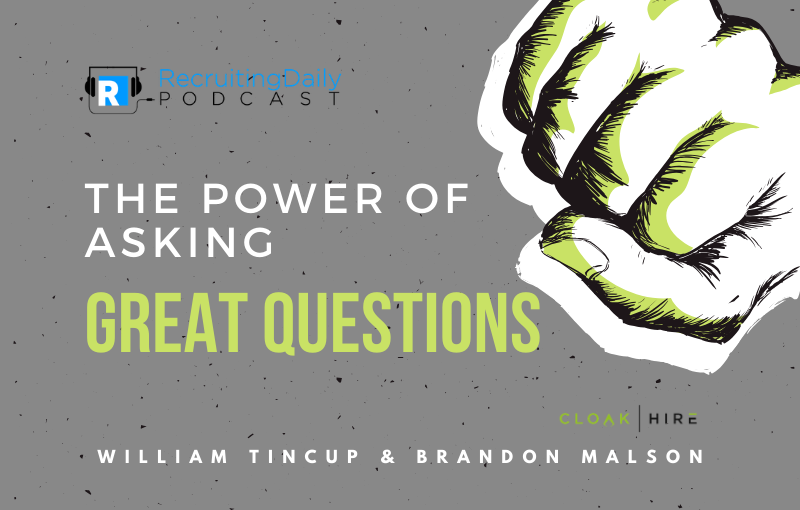The “Big Three”
This right here is a podcast with Brandon Malson from Cloakhire about the power of asking great questions. Why is this important? Ha, see what we did there? That in and of itself is a question!
Well, we’ve known about the strategic importance of great questions for a while, with productivity coach Jason Womack even noting it’s one of the biggest differentiators of great leaders and great salespeople — and, sadly, it’s a skill we seem to see dropping off in many organizations.
Right up top in this podcast, you’ll learn Brandon’s kinda “Big Three” when he approaches a new contact, those being — >
-
- How did you get into the business?
- What are you working on right now that’s new and exciting?
- Where do you see current projects evolving over the next 3-5 years?
This is not reinventing the wheel, no. But it is very smart.
First, people like to talk about themselves, and in an era where we all spend billions on superhero movies, people like to re-imagine their own “origin stories.” That’s Question 1.
Second, people like to talk about themselves. Did we mention that already? That speaks to Question 2.
And third, we all live in a very uncertain (“VUCA”) business time, and we want to steer ourselves by believing we know what’s coming down the pike.
We’re all futurists! That speaks to Question 3.
Smart stuff. Go listen.
Problems and solutions
This drives most of sales — and honestly, a lot of recruiting. One of the interesting things in this podcast — it happens around the 34-minute mark, give or take — is a discussion on timing as relates to question-based sales discussions and projects.
“Timing” in this context means “Look, if this project is under $40,000, we can do it next month, but if it’s over…” A lot of salespeople are afraid to have transparent pricing discussions (real talk), and that hinders the progress of a lot of these conversations. But reframing it around specific timing as opposed to “Hey, I need this much for quota/project, can you do it now?” is a smarter approach.
Again, solid stuff. Go give it a listen.
Boring questions
This is covered a bit, and there’s a future podcast coming with Cloakhire on building rapport — but this needs to be mentioned here. A lot of people, when they initiate conversations — be those sales convos, recruiting convos, or networking convos — are flat-out boring. They lead with “So, what do you do?” and/or canned responses about their industry. Everyone has been in thousands of these conversations.
They don’t excite us, and thus they don’t move the ball down the field in terms of new opportunities or anything. David Burkus, a management consultant type, actually has a good list of other conversation-starters, all of which are questions:
- What excites you right now?
- What are you looking forward to?
- What’s the best thing that happened to you this year?
- Who’s your favorite superhero?
- What’s the most important thing I should know about you?
- What do you do for fun?
- Is there a charitable cause you support?
Notice some of these overlap with Brandon’s Qs. The superhero one might be a bit weird depending on responses, but the rest are pretty solid — although “What do you do for fun?” can elicit generic responses too.
Questions drive thinking, and thinking drives good convos, and good convos drive new opportunities. That’s the path. And if you want to double down on how to make all this stuff work, give this podcast a listen.
Listening Time: 48 Minutes
This recording is Part II of a 3-part series with Brandon Malson of Cloakhire. Listen to the first recording here: The Strength of No
Authors
William Tincup
William is the President & Editor-at-Large of RecruitingDaily. At the intersection of HR and technology, he’s a writer, speaker, advisor, consultant, investor, storyteller & teacher. He's been writing about HR and Recruiting related issues for longer than he cares to disclose. William serves on the Board of Advisors / Board of Directors for 20+ HR technology startups. William is a graduate of the University of Alabama at Birmingham with a BA in Art History. He also earned an MA in American Indian Studies from the University of Arizona and an MBA from Case Western Reserve University.



Discussion
Please log in to post comments.
Login